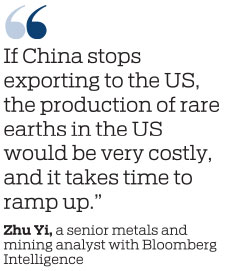Rare earths play crucial role
Increasing high-tech use of metals boosts strategic value, analysts say
China's rare-earth metals should be regarded as strategic resources due to their importance in downstream applications and the difficulties in exploring for and processing them, according to analysts.
"The low prices of China's exports have failed to reflect the real value of the precious resource," said Zhu Yi, a senior metals and mining analyst with Bloomberg Intelligence.
"Rare earths are strategic to making high-tech products such as technical products, electric vehicles and military (equipment), and it's necessary that these elements applied in smartphones, consumer electronics, military equipment and electric vehicles be given strategic due."
According to Zhu, exports of rare earths from China, which has the largest reserves and is the biggest producer of rare earths, especially heavy rare-earth elements, barely reflect their real value.
"While China's reserve of rare earths accounted for 38 percent of the global total in 2018, it produced 72 percent of the global total," she said.
"Comparatively, Brazil, the world's second-largest country with a rare earth reserve and which accounts for 18 percent of the total global reserve, only produced 1 percent of the world's total."
China's rare-earth industry, which also faces such challenges as rapidly decreasing inventory, inefficient production and environmental pollution, mostly involves initial processing such as exploration and extraction. However, it lacks high value-added further processing, said Zhu.
Figures from Bloomberg show that China, the world's largest rare-earth exporter, exported 53,000 tons of rare earths in 2018, up 4 percent year-on-year.
The National Development and Reform Commission, China's top economic planner, said on Tuesday that China is willing to continue supplying rare-earth metals to world markets but is opposed to those who use products made with such rare earths trying to "suppress and dampen China's development".
It also said the industries of China and the United States are highly complementary, and cooperation will benefit both countries, while confrontation will only undermine their interests.
The NDRC also said China will adhere to the principle of fair and free trade in its management of rare-earth exports, but "the Chinese people will be unhappy" if the country's exported rare-earth metals are used against China.

The division of labor of the global rare-earth industry should be coordinated in accordance with the principle of opening-up and sharing, and while the country prioritizes the domestic use of rare-earth metals, it is willing to see its exports help drive the development of global industries, it said.
According to Zhu, the US relies on rare-earth imports from China, although it is rich itself in rare-earth resources.
"Importing from China is cheaper than producing domestically," she said.
China has regulated its rare-earth industry by forming six large rare-earth producing corporations and issuing annual export quotas.
"If China stops exporting to the US, the production of rare earths in the US would be very costly, and it takes time to ramp up," she added.
Jin Baisong, a former researcher at the Chinese Academy of International Trade and Economic Cooperation, said China needs to set up an export controls and economic sanctions systems for certain products, especially strategically important ones that China produces in bulk. This should be done under the condition that the control and sanction systems are transparent, based on the rule of law and consistent with international and World Trade Organization regulations, Jin said.
Since the start of the China-US trade friction more than a year ago, Washington has taken many measures, including taking advantage of its edge in high-end chip making, to stymie Chinese high-tech companies, the NDRC said.
China is the world's largest producer of rare earths, accounting for about 80 percent of global supply. It also ships out about 80 percent of the rare-earth materials imported by the US, according to the US Geological Survey.
President Xi Jinping visited JL MAG Rare-Earth Co on May 20 in Ganzhou, Jiangxi province, during a three-day inspection tour. Xi learned about the rare-earth industry's development in Ganzhou, a major producer of rare-earth resources and products in China.
zhengxin@chinadaily.com.cn
(China Daily Global 05/30/2019 page1)


















